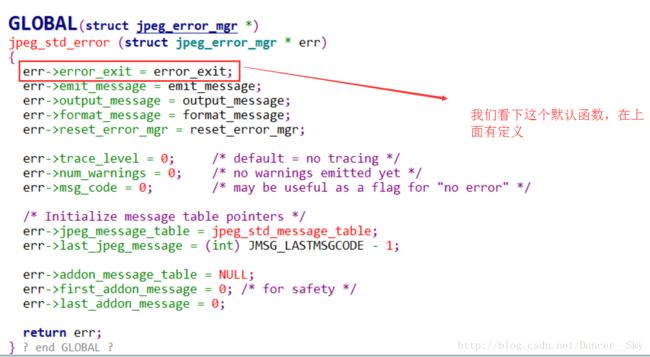关于libjpeg或libjpeg-turbo使用中的一个注意事项
概述:在使用libjpeg在我的项目中,在测试过程中压缩图像出错,然后程序直接退出了,这对于我们程序来说那肯定是不行的啊。所以就开始找问题啦,在网上找到原因,原来是我们在压缩过程中使用了libjpeg默认的出错处理函数error_exit(),所以导致出错以后程序就整个退出了。今天我主要就是把这个分析的过程记录下来。
我们先看一个例子,我们使用默认的错误处理函数进行图片解压缩。代码如下:
#include 我们看一下正确的jpg图片,解压缩执行结果:

程序解压正确,程序一直运行,未退出,我们复制这张图片,用vim打开我们的图片,随便删除一些内容,损坏这张图片,我们再运行看一下结果:

程序直接退出了,那我们看一下libjpeg源码,分析一下为何会直接退出呢。
在我们例子中用了以下的代码:
/*错误处理函数*/
struct jpeg_error_mgr jerr;
cinfo.err = jpeg_std_error(&jerr);首先看一下,jpeg_std_error()这个函数(在jerror.c文件),这个函数其实就是初始化的作用。最主要的就是error_exit.
接下来我们看一下,libjpeg中默认的error_exit函数。
从上面的error_exit函数我们知道了,为何程序会退出,就在最后一句啦。exit(EXIT_FAILURE);
那这个函数何时调用的呢,我们在jerror.h中看到如下宏定义:
我们搜索ERREXIT关键字,发现在我们解压,压缩这样调用的函数,源代码中出错时都会调用上图中的函数,所以一出现错误,程序就会退出。
那如何解决这样的问题呢,其实在libjpeg源码中,examaple.c中就已经解决了这个问题,怪自己没好好看注释啊,主要还是英文的,我这要好好学习英语啦。那我们看一下这个例子吧,同样是解压缩的例子,和上面例子唯一的区别就是,我们用自己的错误处理函数,代替了原有的错误处理函数error_exit.
例子代码如下:
#include 我们编译完成后,用这个代码执行对已经损坏的jpg文件,解压。我们看看程序是不是还会退出呢。当然,程序没有退出啦,结果如下:
其实这里主要用到的就是下面代码,用自己的错误处理函数,覆盖默认的函数。
/*自定义一个错误处理的结构体*/
struct skyjpeg_error_mgr {
struct jpeg_error_mgr pub;
jmp_buf setjmp_buffer;
};
typedef struct skyjpeg_error_mgr *skyjpeg_error_ptr;
/*自己的错误处理函数*/
void skyjpeg_error_exit (j_common_ptr cinfo)
{
char skyjpeg_error_msg[JMSG_LENGTH_MAX];
/* cinfo->err really points to a my_error_mgr struct, so coerce pointer */
skyjpeg_error_ptr myerr = (skyjpeg_error_ptr) cinfo->err;
/* Always display the message. */
/*这是官方例子里面的,打印出错误信息,我们就不用这个,我们让它把错误信息放到一个数组里面*/
/*(*cinfo->err->output_message) (cinfo);*/
/*错误信息放到数组*/
(*cinfo->err->format_message) (cinfo, skyjpeg_error_msg);
/*打印错误信息*/
printf("\n error msg:\n %s\n",skyjpeg_error_msg);
/* Return control to the setjmp point */
longjmp(myerr->setjmp_buffer, 1);
}
cinfo.err = jpeg_std_error(&jerr.pub);
/*用我们定义的skyjpeg_error_exit函数覆盖libjpeg默认的error_exit函数*/
jerr.pub.error_exit = skyjpeg_error_exit;
if (setjmp(jerr.setjmp_buffer)) {
jpeg_destroy_decompress(&cinfo);
fclose(infile);
return NULL;
}
总结:
OK,问题解决。但是这些问题也是因为没有好好看例子所以导致了一些问题的出现,所以在使用第三方库时最好还是好好看看例子及注释,避免一些不必要的错误。Peace&Love.



